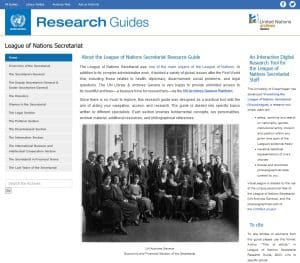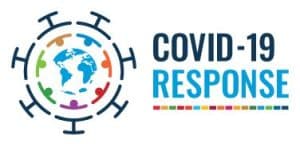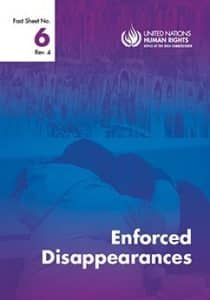New UN websites & publications
UN in General
New agenda sets sail with bold action as UN Water Conference closes (UN News, 24 March 2023)
The UN 2023 Water Conference closed on 24 March 2023 Friday with the adoption of the Water Action Agenda, a “milestone” action plan containing almost 700 commitments to protect “humanity’s most precious global common good”.
English: https://news.un.org/en/story/2023/03/1135022
French: https://news.un.org/fr/story/2023/03/1133667
Spanish: https://news.un.org/es/story/2023/03/1519677
Portuguese: https://news.un.org/pt/story/2023/03/1811947
see also: Historic UN 2023 Water Conference generates transformative commitments
(27 March 2023): https://www.unwater.org/news/historic-un-2023-water-conference-generates-transformative-commitments
UN Archives Geneva Research Guide: League of Nations Secretariat
https://libraryresources.unog.ch/LONSecretariat
UN Archives in Geneva has developed a new research guide on the League of Nations Secretariat with Saxo Institute, University of Copenhagen.
Coronavirus Disease (COVID-19)
Access to NCD medicines: emergent issues during the COVID-19 pandemic and key structural factors (WHO)
https://www.who.int/publications/i/item/9789240069442
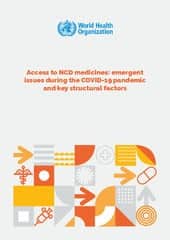
COVID-19 School Closures, Learning Losses and Intergenerational Mobility (World Bank Policy Research Working Paper 10381)
https://www.preventionweb.net/publication/covid-19-school-closures-learning-losses-and-intergenerational-mobility
The paper presents a first global investigation of the longer-term inequality implications of COVID-19 by examining the effect of school closures on the ability of children from different countries and backgrounds to engage in continued learning throughout the pandemic, and their implications for intergenerational mobility in education. The analysis builds on the data from the Global Database of Intergenerational Mobility, country-specific results of the learning loss simulation model using weekly school closure information from February 2020 to February 2022, and high-frequency phone survey data collected by the World Bank during the pandemic to assess the incidence and quality of continued learning during periods of school closures across children from different backgrounds. Based on this information, the paper simulates counterfactual levels of educational attainment and corresponding absolute and relative intergenerational educational mobility measures with and without COVID-19 impacts, to arrive at estimates of COVID-19 impacts. The simulations suggest that the extensive school closures and associated learning losses are likely to have a significant impact on both absolute and relative intergenerational educational mobility in the absence of remedial measures. In upper-middle-income countries, the share of children with more years of education than their parents (absolute mobility) could decline by 8 percentage points, with the largest impacts observed in the Latin America region. Furthermore, unequal access to continued learning during school closures across children from households of different socioeconomic backgrounds (proxied by parental education levels) leads to a significant decline in relative educational mobility.
Impact of the COVID-19 pandemic on violations against children in situations of armed conflict: Follow-Up Study
https://childrenandarmedconflict.un.org/wp-content/uploads/2022/12/OSRSG-COVID-19-study-web-fa.pdf
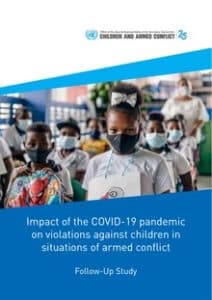
What the COVID-19 Pandemic has Exposed: the Findings of Five Global Health Workforce Professions (Human Resources for Health Observer Series No. 28)
https://www.who.int/publications/i/item/9789240070189
Early in the COVID-19 pandemic, WHO asserted that a holistic assessment of the COVID-19 pandemic’s impact is needed and accordingly formulated a comprehensive framework for measurement and reporting that broadly draws upon four main domains. Two domains, ‘health’ and ‘social and well-being,’ are central to the individual HCW and two domains, ‘availability and distribution’ and ‘working conditions,’ are central to the organizational and working environment. The overarching goal of this holistic framework is to empower countries, global partners and WHO to collectively inform strategies that guide recovery plans, future investments, and further develop the health and care workforce at the national and global levels. Relative to that, the primary objective of the evidence synthesis (guided by WHO’s four domains of interest) is to triangulate data and information generated by the World Health Professions Alliance. It was conducted using information and report summaries from the World Health Professions Alliance to generate a comparative secondary analysis of the surveys conducted in the period 2020–2021. No standardized data collection instrument, variable, or question was used across the five organizations. Instead, the organizations gathered data from their respective national professional associations using various instruments and developed reports that discussed either the pandemic specifically or in conjunction with additional priority issues. At least one World Health Professions Alliance organization is represented in 169 (87%) of the 194 WHO Member States. In 42 Member States (21%), all five World Health Professions Alliance organizations are represented. This evidence synthesis describes how the five professions were impacted by the COVID-19 pandemic in common and different ways by comparing the experiences of dentists, nurses, pharmacists, physicians and physiotherapists. The individual organizational findings of the five World Health Professions Alliance organizations inform the five key themes and the subsequent findings and recommendations. The inspiration was to inform future data collection efforts by building upon collective knowledge, data accessibility and question formats that have generalizable applicability to all World Health Professions Alliance organizations.
Economic Growth and Sustainable Development
AR6 Synthesis Report: Climate Change 2023 (IPCC)
https://www.ipcc.ch/report/ar6/syr/
https://www.ipcc.ch/report/sixth-assessment-report-cycle/
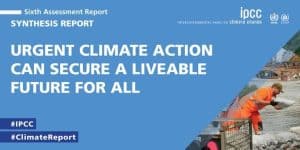
Asia and the Pacific Sustainable Development Goals Progress Report 2023: Championing sustainability despite adversities (UNESCAP)
https://www.unescap.org/kp/2023/asia-and-pacific-sdg-progress-report-2023
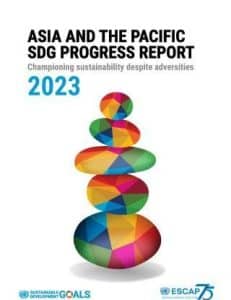
Building Bright Futures: What is needed to expand early childhood education and care for Ukraine’s refugee children (Innocenti Research Report)
https://www.unicef-irc.org/publications/1691-building-bright-futures-what-is-needed-to-expand-early-childhood-education-and-care-for-ukraines-refugee-children.html
Nine out of every 10 refugees arriving in host countries from Ukraine are women and children. Only 1 in 3 of Ukrainian refugee children are enrolled in early childhood education and care services. This emphasizes the need for expanding and strengthening early childhood education systems to ensure sufficient access for all children, and the integration of Ukranian refugee children in the host-community. These briefs offer recommendations for policymakers on ways to expand services, and how to facilitate the integration of refugee children and their families. Strategies include limiting the barriers that may hinder refugee children’s access to ECEC settings, capitalizing existing physical and human resources to address gaps in service delivery, in addition to the inclusion of refugees in national and sub-national plans, data systems and financing, adapting policies and programmes to ensure considerations are made for refugee children.
Climate Action in the Tourism Sector: An Overview of Methodologies and Tools to Measure Greenhouse Gas Emissions” (UNWTO)
https://www.e-unwto.org/doi/10.18111/9789284423927
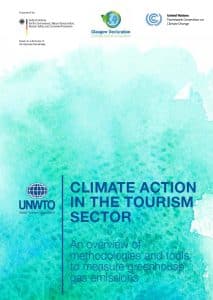
Connections that matter: How does the quality of governance institutions help protect our Ocean? (UNDP)
https://www.undp.org/publications/connections-matter-how-does-quality-governance-institutions-help-protect-our-ocean
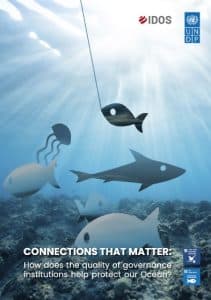
Employment Policy Action Facility (EPAF)
https://www.ilo.org/global/topics/employment-promotion/epaf/lang–en/index.htm
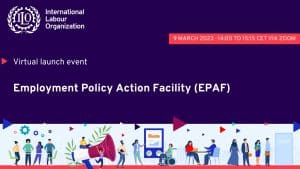
Europe and Central Asia – Regional Overview of Food Security and Nutrition 2022: Repurposing policies and incentives to make healthy diets more affordable and agrifood systems more environmentally sustainable
https://www.fao.org/documents/card/en/c/cc4196en
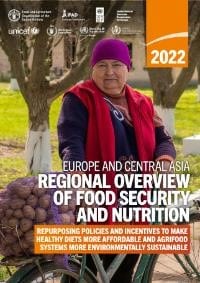
Global Bottled Water Industry: A Review of Impacts and Trends (UNU-INWEH)
https://inweh.unu.edu/wp-content/uploads/2023/03/UNU_BottledWater_Report_F.pdf
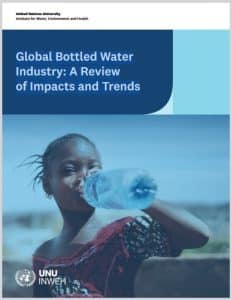
see also: https://inweh.unu.edu/bottled-water-masks-worlds-failure-to-supply-safe-water-for-all-can-slow-sustainable-development/
Global Report on Cocaine 2023: Local dynamics, global challenges (UNODC)
https://www.unodc.org/documents/data-and-analysis/cocaine/Global_cocaine_report_2023.pdf
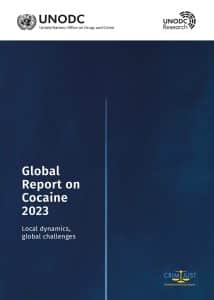
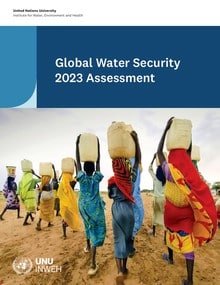
https://inweh.unu.edu/global-water-security-2023-assessment/
A global water security assessment led by United Nations water experts found that the majority of the world’s population currently live in water-insecure countries. This is a cause for major concern because water security is fundamental to development. This global assessment released on the second day of the UN 2023 Water Conference provides a multidimensional comparison of the state of water security affecting 7.8 billion people across 186 countries midway into the Water Action Decade (2018-2028) and the 2030 Agenda for Sustainable Development. The report provides some very alarming statistics, arguing that the world is far from achieving “clean water and sanitation for all” known as Sustainable Development Goal (SDG) 6.
Guidance for Wind Energy Projects in a World Heritage Context (UNESCO online tool)
English: https://whc.unesco.org/en/wind-energy
French: https://whc.unesco.org/fr/wind-energy/
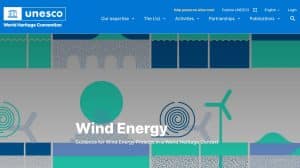
How to make data work for the 2030 Agenda for Sustainable Development: Note by the UNCTAD secretariat (TD/B/EDE/6/2, 28 February 2023)
English, French & Spanish: https://undocs.org/TD/B/EDE/6/2
“Summary: The role that data can play in the achievement of the 2030 Agenda for Sustainable Development is addressed in the present note. Data and digital technologies are becoming increasingly critical in monitoring and achieving sustainable development. Challenges faced in harnessing data and cross-border data flows are discussed in this note, in particular among developing countries, along with ways of capturing and sharing more equitably the benefits from the digital economy and the ways in which national, regional and international approaches can contribute to harnessing data for the 2030 Agenda and in order to make up lost ground due to recent crises. In this context, it is critical to strengthen international cooperation on global data governance and capacity-building aimed at bridging data and digital divides, to enable a better future for people and the planet.”
In our words: Voices of Women of African Descent for Reproductive and Climate Justice (UNFPA)
English, French & Portuguese: https://www.unfpa.org/publications/our-words-voices-women-african-descent-reproductive-and-climate-justice
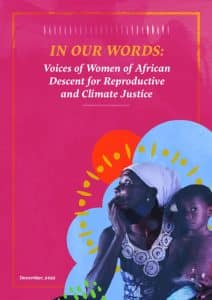
Measuring Progress: Water-related ecosystems and the SDGs (UNEP)
https://www.unep.org/resources/report/measuring-progress-water-related-ecosystems-and-sdgs
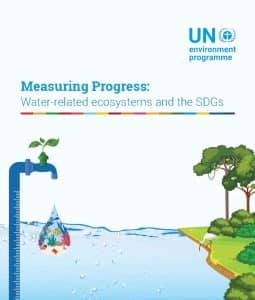
The latest available data for the 92 environment-related SDG indicators tell us that the world is not on track to achieve the environmental dimension of the SDGs by 2030. However, 38 per cent of the 92 indicators signal environmental improvement – a solid improvement compared to only 28 per cent in 2020. At the same time, 21 per cent of indicators saw negative or no change, and 41 per cent lack data.
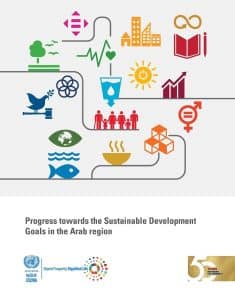
https://www.unescwa.org/publications/progress-towards-sdgs-arab-region
The Arab region, which has been characterized by instability and conflict for the past two decades, is facing various challenges. Moreover, the COVID-19 pandemic has not only hampered development efforts, increased poverty, and burdened health systems in many Arab countries, but it has also halted data production crucial to monitoring development progress and the impact of policies. The 2022 High-level Political Forum on Sustainable Development called for a new phase of accelerated progress towards the Sustainable Development Goals. It is therefore more urgent than ever to drive development and compile much-needed evidence to measure progress, stagnation and setbacks. The present report provides information on the region’s progress in each of the 17 SDGs and their 169 target and related indicators, and highlights where the region now stands in relation to 2030, with a 2015 baseline. It stresses the importance of data availability and its impact on planning processes. It also presents key messages under each Goal.
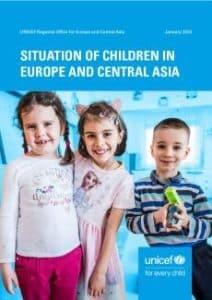
https://www.unicef.org/eca/reports/situation-analysis-children-rights-europe-and-central-asia
The COVID-19 pandemic, climate disasters and ongoing conflict have deepened inequalities among children in Europe and Central Asia, the UN Children’s Fund (UNICEF) said in a report published on 9 March 2023, calling for more robust support for boys and girls at risk of poverty and social exclusion. The report on children’s rights is the first of its kind to bring together existing data and analysis for all countries in the region, while highlighting critical data gaps that need to be filled. UNICEF Regional Director Afshan Khan said the war in Ukraine, the pandemic, climate change and the current economic and energy crisis have plunged many families into uncertainty, affecting their well-being and that of their children. An estimated 35 to 40 million children across Europe and Central Asia are living in poverty, according to UNICEF. The report reveals inequalities in access to healthcare and education for some of the most vulnerable.
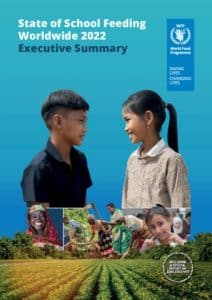
Report in English, Executive Summary in English, French & Spanish: https://www.wfp.org/publications/state-school-feeding-worldwide-2022
Amidst a global food crisis which sees families in many countries struggling to put food on the table, a new report says governments worldwide are increasingly convinced that school meals are a powerful and cost-effective way of ensuring that vulnerable children get the food they need. Almost 420 million children worldwide receive school meals on 21 March 2023, according to the State of School-Feeding Worldwide report, issued on 21 March 2023 by the UN World Food Programme. At a time when 345 million people face crisis levels of hunger, including 153 million children and young people, school meals are a critical safety net for vulnerable children and households, the report said.
see also: https://www.wfp.org/stories/4-things-you-should-know-about-school-feeding-worldwide
Technology and Innovation Report 2023: Opening green windows; Technological opportunities for a low-carbon world (UNCTAD)
https://unctad.org/tir2023
Many developing countries may miss out on the benefits of the “green tech” revolution unless governments and the international community take decisive action now, the head of the UN Conference on Trade and Development (UNCTAD) said on 16 March 2023, releasing its latest report. The 17 frontier technologies covered in UNCTAD’s Technology and Innovation Report 2023 have the potential to create market revenues of more than $9.5 trillion by 2030, about three times the size of India’s economy today. Used to produce goods and services with smaller carbon footprints, the new wave of green technologies spans artificial intelligence to electric vehicles. The report calls for coherent policy action to enable developing countries to profit from green tech or risk facing growing economic inequalities, as developed countries reap most of the benefits.
Trade Hope: The impact of the Black Sea Grain Initiative (UNCTAD)
https://unctad.org/system/files/official-document/osginf2023d3_en.pdf
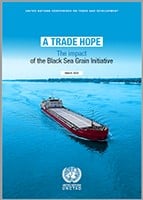
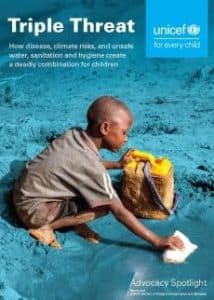
https://www.unicef.org/reports/triple-threat-wash-disease-climate
190 million children in 10 African countries are at the highest risk from a convergence of three water-related threats – inadequate water, sanitation, and hygiene (WASH); related diseases; and climate hazards – according to a new UNICEF analysis. The triple threat was found to be most acute in Benin, Burkina Faso, Cameroon, Chad, Côte d’Ivoire, Guinea, Mali, Niger, Nigeria, and Somalia, making West and Central Africa one of the world’s most water-insecure and climate-impacted regions, according to the analysis. Many of the worst-affected countries, particularly in the Sahel, are also facing instability and armed conflict, further aggravating children’s access to clean water and sanitation.
Ukraine – Rapid Damage and Needs Assessment: February 2022 – 2023
http://documents.worldbank.org/curated/en/099184503212328877/P1801740d1177f03c0ab180057556615497
A new joint assessment released on 23 March 2023 by the Government of Ukraine, the World Bank Group, the European Commission, and the United Nations, estimates that the cost of reconstruction and recovery in Ukraine has grown to US $411 billion (equivalent of €383 billion). The estimate covers the one-year period from Russia’s invasion of Ukraine on February 24, 2022, to the first anniversary of the war on February 24, 2023. The cost of reconstruction and recovery is expected to stretch over 10 years and combines both needs for public and private funds. This second Rapid Damage and Needs Assessment (RDNA2) provides a comprehensive evaluation of war impacts across twenty different sectors. It quantifies the direct physical damage to infrastructure and buildings and describes the impact on people’s lives and livelihoods. The RDNA2 also includes the amounts needed for recovery and reconstruction. The RDNA2 estimates Ukraine will need $14 billion for critical and priority reconstruction and recovery investments in 2023. Meeting these needs will require $11 billion in financing beyond what the government has already addressed in its 2023 budget, including $6 billion in unfunded budget needs and another $5 billion in financing to support state-owned enterprises (SOEs) and catalyze the private sector.
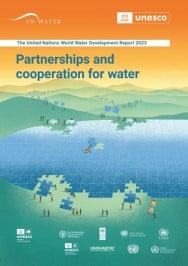
English: https://www.unesco.org/reports/wwdr/2023/en
French: https://www.unesco.org/reports/wwdr/2023/fr
Spanish: https://www.unesco.org/reports/wwdr/2023/es
Between two and three billion people worldwide experience water shortages. These shortages will worsen in the coming decades, especially in cities, if international cooperation in this area is not boosted, warn UNESCO and UN-Water in the latest edition of the UN World Water Development Report. Globally, 2 billion people (26% of the population) do not have safe drinking water and 3.6 billion (46%) lack access to safely managed sanitation, according to the report, published by UNESCO on behalf of UN-Water and released on 22 March 2023 at the UN 2023 Water Conference in New York. Between two and three billion people experience water shortages for at least one month per year, posing severe risks to livelihoods, notably through food security and access to electricity. The global urban population facing water scarcity is projected to double from 930 million in 2016 to 1.7–2.4 billion people in 2050. The growing incidence of extreme and prolonged droughts is also stressing ecosystems, with dire consequences for both plant and animal species.
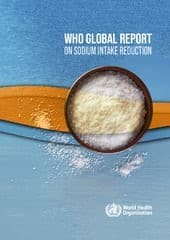
https://www.who.int/publications/i/item/9789240069985
A first-of-its-kind World Health Organization (WHO) Global report on sodium intake reduction shows that the world is off-track to achieve its global target of reducing sodium intake by 30% by 2025. Sodium, an essential nutrient, increases the risk of heart disease, stroke and premature death when eaten in excess. The main source of sodium is table salt (sodium chloride), but it is also contained in other condiments such as sodium glutamate. The report shows that only 5% of WHO Member States are protected by mandatory and comprehensive sodium reduction policies and 73% of WHO Member States lack full range of implementation of such policies. Implementing highly cost-effective sodium reduction policies could save an estimated 7 million lives globally by 2030. It is an important component of action to achieve the Sustainable Development Goal target of reducing deaths from noncommunicable diseases. But today, only nine countries (Brazil, Chile, Czech Republic, Lithuania, Malaysia, Mexico, Saudi Arabia, Spain and Uruguay) have a comprehensive package of recommended policies to reduce sodium intake. … WHO calls on Member States to implement sodium intake reduction policies without delay and to mitigate the harmful effects of excessive salt consumption. WHO also calls on food manufacturers to set ambitious sodium reduction targets in their products.
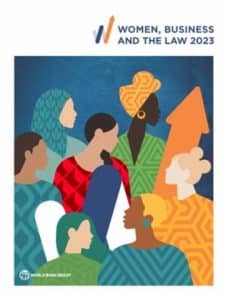
Report in English, Executive Summary in English, French & Spanish: http://hdl.handle.net/10986/39462
“Women, Business and the Law 2023” is the ninth in a series of annual studies measuring the laws and regulations that affect women’s economic opportunity in 190 economies. The project presents eight indicators structured around women’s interactions with the law as they move through their lives and careers: Mobility, Workplace, Pay, Marriage, Parenthood, Entrepreneurship, Assets, and Pension. The 2023 edition identifies barriers to women’s economic participation and encourages reform of discriminatory laws. This year, the study also includes research, a literature review, and analysis of 53 years of reforms for women’s rights. Examining the economic decisions that women make throughout their working lives as well as tracking regulatory changes from 1970 to today, the study makes an important contribution to research and policy discussions about the state of women’s economic opportunities. By presenting powerful examples of change and highlighting the gaps still remaining, “Women, Business and the Law 2023” is a vital tool in ensuring economic empowerment for all. Data in “Women, Business and the Law 2023” are current as of October 1, 2022.
World Employment and Social Outlook 2023: The value of essential work (ILO)
https://www.ilo.org/digitalguides/en-gb/story/weso2023-key-workers
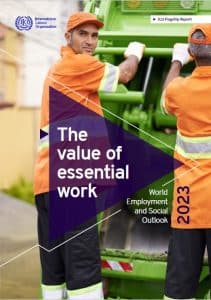
International Peace and Security
Concept note for the Security Council briefing on strengthening security sector reform and governance
English, French & Spanish: https://undocs.org/S/2023/168
Mozambique, in its capacity as President of the Security Council for the month of March 2023, chaired a briefing on the topic “Maintenance of international peace and security: security sector reform”, on 16 March 2023. In order to guide the discussions, Mozambique has prepared this concept note.
Concept note for the Arria-formula meeting on the theme “Situation of human rights in the Democratic People’s Republic of Korea”
English, French & Spanish: https://undocs.org/S/2023/192
The Permanent Mission of Albania to the United Nations, with the United States Mission to the United Nations, organized an Arria-formula meeting on the theme “The situation of human Rights in the Democratic People’s Republic of Korea” on 17 March 2023. In order to guide the discussions on this topic, this concept note was prepared.
Concept note for the Security Council open debate on the theme “Peace and security in Africa: the impact of development policies in the implementation of the Silencing the Guns initiative”
English, French & Spanish: https://undocs.org/S/2023/148/Rev.1
Mozambique, in its capacity as President of the Security Council for the month of March 2023, convened a Security Council open debate on the theme “Peace and security in Africa: the impact of development policies in the implementation of the Silencing the Guns initiative” on 30 March 2023. In order to guide the discussions on the topic, Mozambique has prepared this revised concept note.
Financing for gender equality and the implementation of the women, peace and security agenda: Assessment of the implementation of a minimum 15 per cent financial target (UN Women)
https://www.unwomen.org/en/digital-library/publications/2023/03/financing-for-gender-equality-and-the-implementation-of-the-women-peace-and-security-agenda
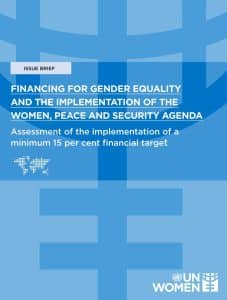
Human Rights
Addressing violence against women through social protection: A review of the evidence (UN Women)
https://www.unwomen.org/en/digital-library/publications/2023/03/policy-brief-addressing-violence-against-women-through-social-protection
In the wake of the “shadow pandemic” of violence against women and girls during COVID-19, policymakers, practitioners, and activists are searching for novel and effective ways to address violence against women (VAW), including in the context of ongoing crises and disasters. Social protection systems provide a wide range of policy tools and mechanisms that have the potential to address VAW. To date, however, this potential is largely unrealized. Policy discussions and practice on social protection and VAW remain siloed and evidence generation dispersed.
Based on a phased scoping review of peer-reviewed academic and grey literature, which captured 48 articles focused on both social protection and gender-based violence, this policy paper brings the two fields together, to identify pathways for harnessing social protection to address VAW. In doing so, the paper enables policymakers to move beyond a focus on singular social protection interventions and towards a systems perspective that opens opportunities for preventing and addressing VAW through a broad range of social protection schemes, such as multisectoral coordination, accompaniment models, and training for social protection providers.
OHCHR Fact Sheet No. 6 (Rev. 4):
Enforced Disappearances
https://www.ohchr.org/en/publications/fact-sheets/fact-sheet-no-6-rev-4-enforced-disappearances
OHCHR report on the Treatment of Prisoners of War and Persons Hors de Combat in the Context of the Armed Attack by the Russian Federation against Ukraine: 24 February 2022 – 23 February 2023
https://www.ohchr.org/sites/default/files/documents/countries/ukraine/2023/23-03-24-Ukraine-thematic-report-POWs-ENG.pdf
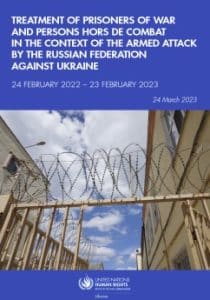
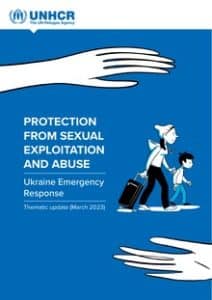
https://data.unhcr.org/en/documents/details/99863
Safeguarding and protection from sexual exploitation and abuse (PSEA) are key priorities for UNHCR, the UN Refugee Agency, in the Ukraine emergency response. The Ukraine situation is one of the largest forced displacement crises in the world today, with more than 8 million refugees across Europe. The emergency is characterized by a number of heightened risk factors, such as a high incidence of family separation, and of women and children travelling alone, as well as a wide range of new actors involved in the response, many of whom have limited experience and capacity on PSEA. Separated and unaccompanied children, persons with disabilities, LGBTIQ+ persons, and members of the Roma community are considered to be at particular risk of SEA. In 2023, the risks of SEA are expected to increase due to the increasing socio-economic difficulties facing refugees in neighbouring countries and the dwindling support from host communities, and humanitarian actors. As the emergency enters into its second year, it is therefore essential to maintain collective efforts to safeguard refugees from sexual exploitation and abuse. This note outlines the ongoing and planned efforts by UNHCR and partners to prevent, mitigate risk of, and to respond to, SEA in Ukraine and refugee hosting countries.
“These Wounds Do Not Heal”: Enforced disappearance and abductions by the Democratic People’s Republic of Korea (OHCHR)
https://www.ohchr.org/sites/default/files/documents/countries/korea-dpr/2023-03-28-Enforced-disappearance-DPRK-en.pdf
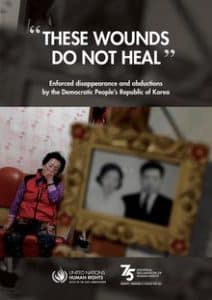
Towards a Human Rights-Based Approach to Migration: Training Guide (OHCHR)
https://www.ohchr.org/en/publications/professional-training-series/towards-human-rights-based-approach-migration-training
This training guide is designed to enable participants to understand the human rights perspective on migration, and how human rights laws and standards can be operationalized to make migration safer and an empowering experience for all. It provides an introduction to related principles and issues and is designed for persons with limited knowledge of human rights or migration. The training guide contains session plans for the trainer and is supported by sample slide presentations and associated materials, including activities and handouts for participants, which are available electronically as individual components.
Justice and International Law
The 8 March Principles for a Human Rights-Based Approach to Criminal Law Proscribing Conduct Associated with Sex, Reproduction, Drug Use, HIV, Homelessness and Poverty
https://icj2.wpenginepowered.com/wp-content/uploads/2023/03/8-MARCH-Principles-FINAL-printer-version-1-MARCH-2023.pdf
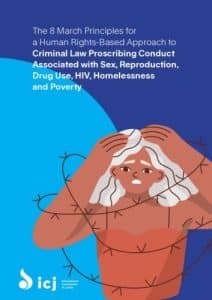
Drug Control, Crime Prevention and Counter-terrorism
Smuggling of Migrants in the Sahel (Mixed Migration Centre / UNODC)
https://www.unodc.org/documents/data-and-analysis/tocta_sahel/TOCTA_Sahel_som_2023.pdf
https://www.unodc.org/unodc/en/data-and-analysis/Tocta_Sahel.html
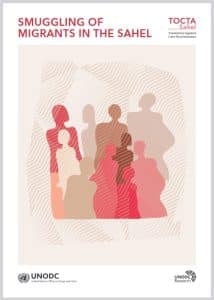
Newsletter Archive: https://unric.org/en/unric-info-point-library-newsletter-archive


